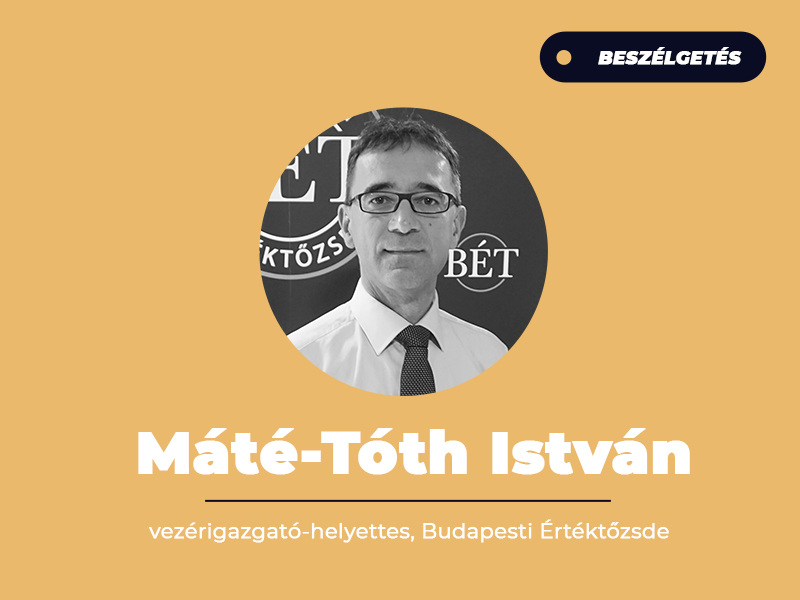This time we had the honour of interviewing Mr. István Máté-Tóth, CFA who is Deputy CEO at the Budapest Stock Exchange.
István participated on our Embedding ESG Frameworks to Drive Corporate Value, Finance Long Term Growth and Attract Responsible Investment course programme last year and contributed to its success by his constructive questions and remarks.
István, you have such a comprehensive and diverse working experience on the market – starting from equity analysis, strategy and product development, going on with primary market supervision and policy making, and ending up with business development, among other relevant fields of responsibilities. We can say you are and have been involved in quite some fields where ESG and the practical frameworks, SDGs should leave their footprints.
István, what was the reason you found it interesting and beneficial for you joining the programme? What did you expect originally ESG frameworks regarding content from participating on the course first, and then we are eager to learn whether you finally could gather the knowledge and information you seeked to receive?
ESG has been a highly relevant and dynamically developing topic on capital markets for some time – for issuers, regulators, investors and market operators. I expected to gather a useful general overview on where we stand currently and learn about the main directions of likely future development, and I am satisfied with the outcome. We learned about how ESG is embedded in investment policies and investment decisions, how it is integrated into corporate strategies among other relevant issues. The programme was well structured, and this has helped with knowledge dissemination.
We are interested in your thoughts, István, about whether, and if so, why this programme should be further continued and developed adding always the updates on the field. If we think of a longer-term project, do you agree that the programme could be adjusted on the bases of the progress that the Hungarian ecosystem has made towards a sustainable economy? We are interested to learn about your opinion on whether you would see and envisage some programme specifically designed for certain key stakeholders in the ecosystem. And, also, if you would like to focus more on the perspective of the banking system as an example.
One of the main advantages of this programme was that we, participants, were furnished with an international overview, a very useful insight into current trends and developments, provided by experts who are practitioners in their respective fields. It is our task then to apply all this in a Hungarian context.
The size of capital markets in Hungary and their role in the economy are currently limited, thus widening the course structure to include the broader financial sector – e.g. commercial banking, insurance – would probably enhance the appeal to the Hungarian audience. There is room for a programme with a sole focus on the Hungarian context in my view.’
We would also like to ask about your understanding of the added value of our programme – why was it unique in its sense of content, complexity, etc. ?
As for the programme in its current form, content quality was of a high level. The programme was well structured and conveyed the multiple aspects of the topic.
What kind of role do you define for the Budapest Stock Exchange in this policy field at national level? Are there any steps the Exchange is implementing now or in the near future on sustainability? (Guidebook under consultation, etc.)
We at the Budapest Stock Exchange see growing demand from asset owners for ESG-compatible investment opportunities, products. It is our task to adapt accordingly.
Recently we have launched a public consultation of our ESG guide and are cooperating closely with all stakeholders. We are keen to ensure that the ESG framework is widely adapted among our issuers in order to ensure they fit the investment decision making process of domestic and international investors.
You have spent quite a lot of years working in the United Kingdom. Besides noting the differences between considerations and developments in the field, and having in mind that the UK is the leading, or if you like “game-changer” state in sustainability, what, in your opinion, are the aspects and paths Hungary could take over from UK and apply (based on your experience and having followed the presentations of the programme)?
The size of capital markets in Hungary is currently small, even for the size and development level of the economy. This unfortunately limits the potential economy-wide impact of capital market based ESG measures. Having said this, we remain optimistic that markets in Hungary will continue to grow as the economy transitions towards a more innovation led, higher value-added structure.
As for the online streaming course format, technicalities and follow-up, information transfer on the organizers’ and hosts’ side, the frames in general, what kind of suggestions you would share with us in order to improve our service for our participants?
The online streaming format was managed well in my view. Greater emphasis could be put on interactivity by perhaps chairing the discussion phase more proactively.
Preliminary questions from the audience could also be elicited providing a good starting base for the Q&A session.
I would recommend this course to others interested in the topic.’
Thank you, István, for your constructive remarks and feedback on our first international ESG training programme that we developed jointly with the London Stock Exchange Academy. We hope to welcome you on our courses in the future as well.
January 2020.
